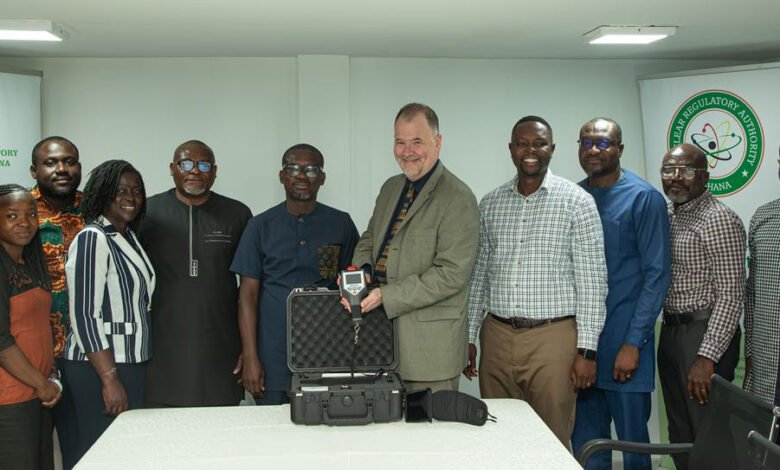US Transfers Radiation Identification Equipment to Ghana Nuclear Regulatory Authority

The United States has reinforced its partnership with Ghana’s nuclear energy sector by donating advanced radiation detection equipment to support the country’s nuclear safeguards program.
During a visit to the Ghana Nuclear Regulatory Authority (NRA), U.S. Chargé d’Affaires, a.i., Rolf Olson, presented the HM-5 identiFINDER device, valued at GHS 270,000 (approximately $26,000 USD). The state-of-the-art equipment is designed to enhance Ghana’s capacity to detect, measure, and identify radioactive and nuclear materials—ensuring compliance with international nuclear safety standards set by the International Atomic Energy Agency (IAEA).
“This support underscores the United States’ commitment to Ghana’s safe and responsible use of nuclear energy,” said Olson, during the handover ceremony.
The NRA, which oversees the peaceful use of nuclear energy in Ghana, plays a crucial role in ensuring that all activities align with global safeguards and non-proliferation obligations. The addition of this high-precision device is expected to bolster Ghana’s IAEA reporting capabilities and improve rapid response to radiological threats or anomalies.
Building a Responsible Nuclear Future
The radiation detection equipment is part of a broader collaboration between Ghana and the United States on civilian nuclear energy development. In January 2025, the U.S. donated a full-scale NuScale Power Small Modular Reactor (SMR) simulator through the Foundational Infrastructure for Responsible Use of Small Modular Reactor Technology (FIRST) Program, installed at the E2 Center within the School of Nuclear and Allied Sciences.
The simulator serves as a virtual training ground for Ghanaian nuclear scientists and engineers, preparing the country for future deployment of clean and modern nuclear technology.
As part of the ongoing support, Ghanaian nuclear engineers have also participated in study tours to the U.S. and Japan, while academic collaborations have been formed with Texas A&M University, a global leader in nuclear engineering. These partnerships are focused on developing tailored SMR curricula for Ghana’s universities, paving the way for long-term local expertise.
Strategic Partnership for Energy Security
With Ghana exploring nuclear power as part of its long-term energy diversification strategy, this partnership with the United States represents a critical step toward building robust safety infrastructure and a skilled workforce.
The U.S. Embassy noted that it remains committed to helping Ghana establish a strong foundation for peaceful, safe, and secure use of nuclear energy technologies.




